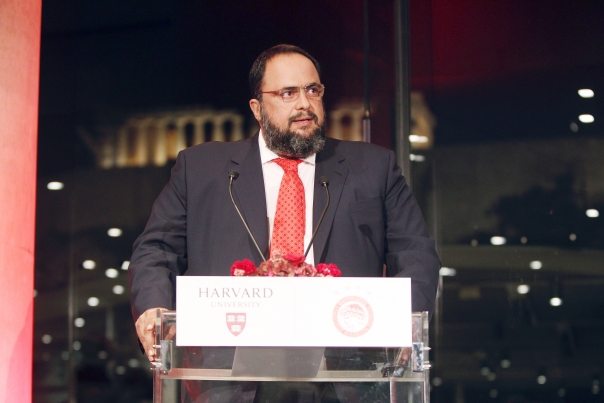By Paul Nicholson
September 6 – Olympiacos president Evangelos Marinakis, speaking at the Athens conference ‘Reinforcing, Crossing, and Transcending Borders: Soccer in a Globalized World’ sent a message to the world’s leading clubs saying “it is vital that they now accept their social responsibility towards their communities, and the world, by means of promoting specific actions and initiatives that can change the lives of everyday people.”
“Hosted at the Acropolis Museum and led by Harvard University with support from Olympiakos, the conference focussed on the plight of refugees in Europe and how sport and football in particular had a responsibility to lead in areas of social inclusion and integration.
Here in Greece, the cradle of democracy and the Olympic Games, we can revisit this ancient tradition whereby sports became an opportunity for the Greek city-states and their citizens to connect, bring together different cultures, respect the rules of fair play and suspend legal disputes and wars for the duration of the Olympic truce, to ensure all athletes and spectators, irrespective of their class or social standing, could travel safely to the Games and peacefully return to their respective countries,” said Marinakis.
“Democracy is based on social justice, when all laws and regulations apply for everyone. Unfortunately in modern Greece social democracy does not apply to everyone, but this will hopefully change soon enough.”
Emphasising his point Marinakis said football “can cross borders, overcome ancient enmity and bring millions of people around the world together. In particular, we will see just how much the opportunity to play or watch sport can mean to refugees and displaced people.”
“We will see how, even in the midst of conflict and deprivation, sport can play a critical role. It can inspire; it can unite us; and it can bring out the best of humanity.”
Greece has been on the frontline of the refugees crisis, accepting waves of people fleeing war zones, poverty and oppressive regimes.
Central to the conference agenda were the establishment of The Athens Principles on the Right to Participate in Sport that were signed by Marinakis and will be distributed to clubs worldwide by Harvard University. Included in the Principles is a call to establish an International Day of the Right to Play which would affirm the right to participate in sport as a universal and fundamental right.
The 12 principles are:
- This Declaration is a common standard of achievement for all clubs, teams, players and sports associations of all sports, to the end that every individual and company should strive, through education and example, to promote respect for these rights and to progressively secure their effective recognition and observance.
- Every human being has a fundamental right to participate in sport without discrimination on the basis of ethnicity, gender, sexual orientation, language, religion, political or other opinion, or national or social origin. Furthermore, no distinction should be made on the basis of the political or international status of the country or territory to which a person belongs. Clubs and sport associations should actively campaign against and refuse to engage in any such discrimination at both youth and professional levels.
- Participation in sport should be based on the principles of healthy and honest competition and respect for all competitors.
- Initiatives that encourage the participation of displaced people, whatever their civil status, in sporting activities should be supported.
- Sport for young people should be first and foremost about participation, physical activity and having fun.
- Girls should have as much access to sport and sport teams as boys, particularly in school and in youth games and leagues.
- Everyone should have equal access without discrimination to sport training, resources and services, as well as the opportunity to participate in all supervision and decision-making at all levels of sport.
- Clubs and sport associations agree to encourage greater participation in sport in conflict ridden or economically depressed areas and, when possible, to contribute financial resources, including providing used but appropriate equipment for the use of those people who lack adequate resources to participate in sport.
- Adequate and safe places, facilities, equipment and dress-options should be provided to meet the needs of all participants in sport, bearing in mind the different needs associated with people of different cultures, genders, ages and abilities.
- Sport facilities should be made more accessible to a greater percentage of the global population.
- An International Day of the Right to Play should be declared to affirm the right to participate in sport as a universal and fundamental right and to promote the principles set out in this Declaration.
- Initiatives should be developed to create partnerships with researchers and NGOs whose work will be helpful to implementing these principles.
Contact the writer of this story at moc.l1745154342labto1745154342ofdlr1745154342owedi1745154342sni@n1745154342osloh1745154342cin.l1745154342uap1745154342
